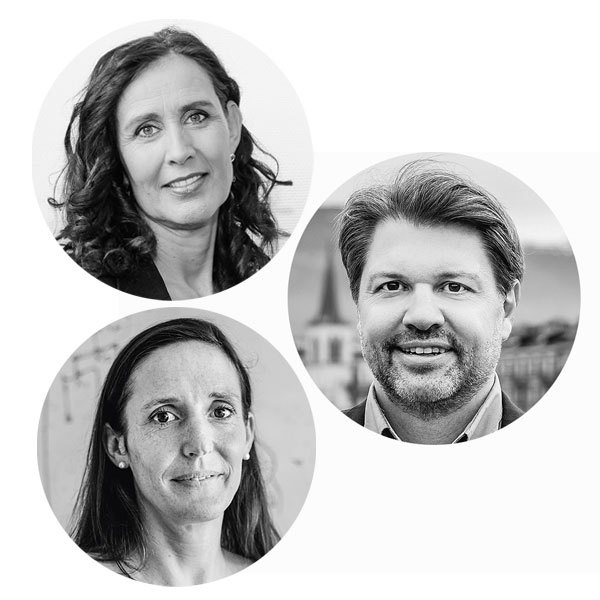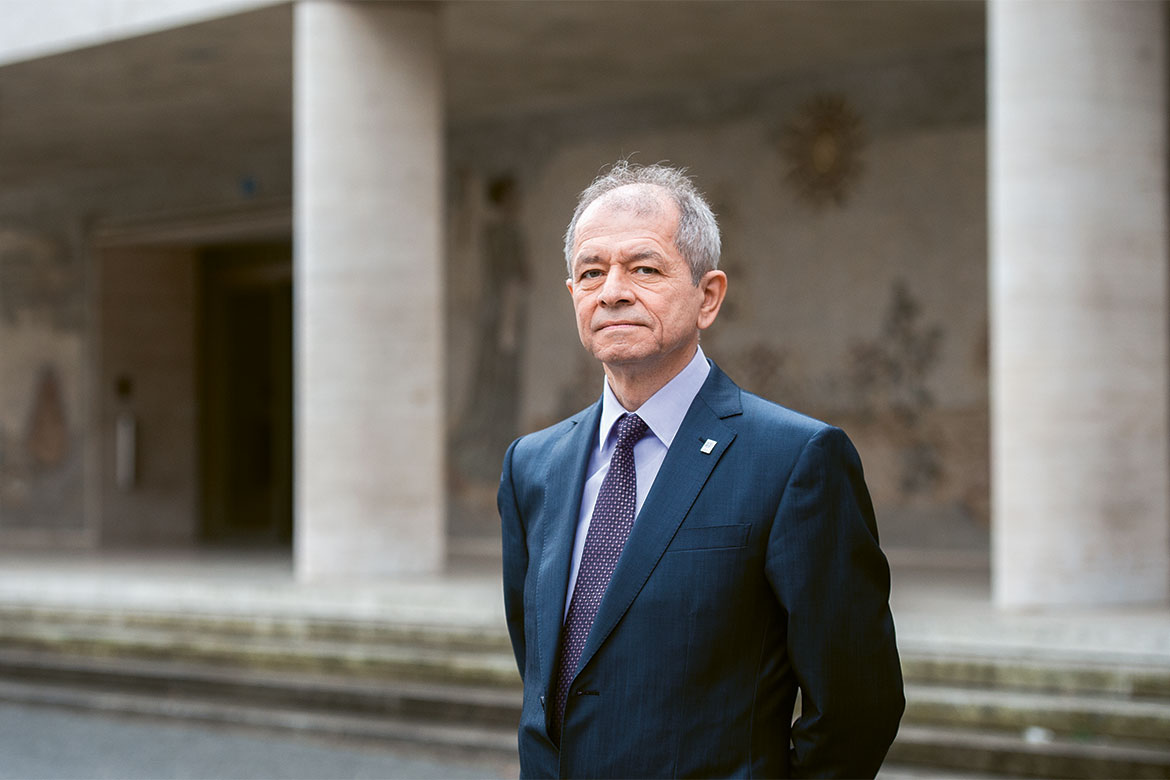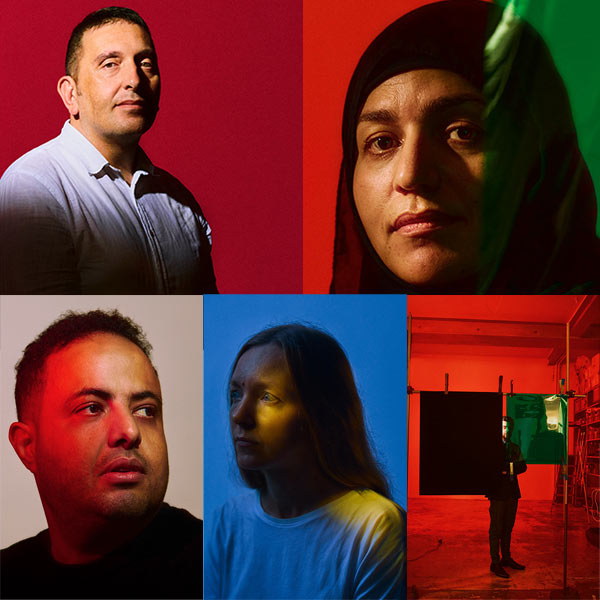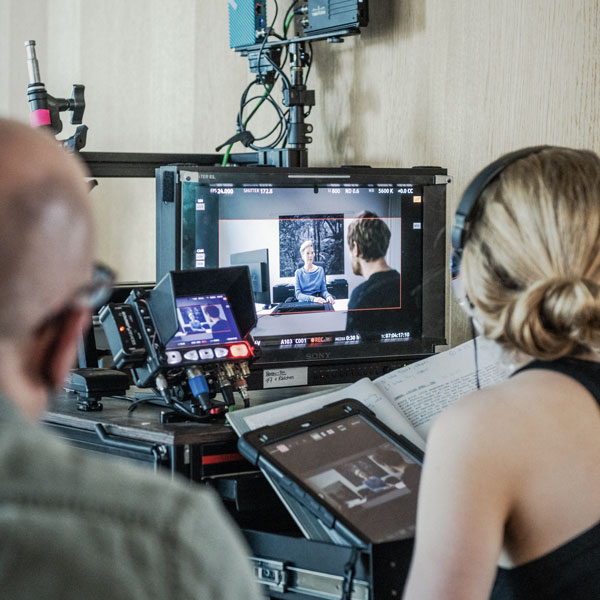The conflict in the Middle East
Scholars still talk when dialogue fails
The heated debate about the events in Israel and the Gaza Strip has not failed to have an impact on the academic world. Representatives from Islamic theological studies and Jewish studies here share their experiences.
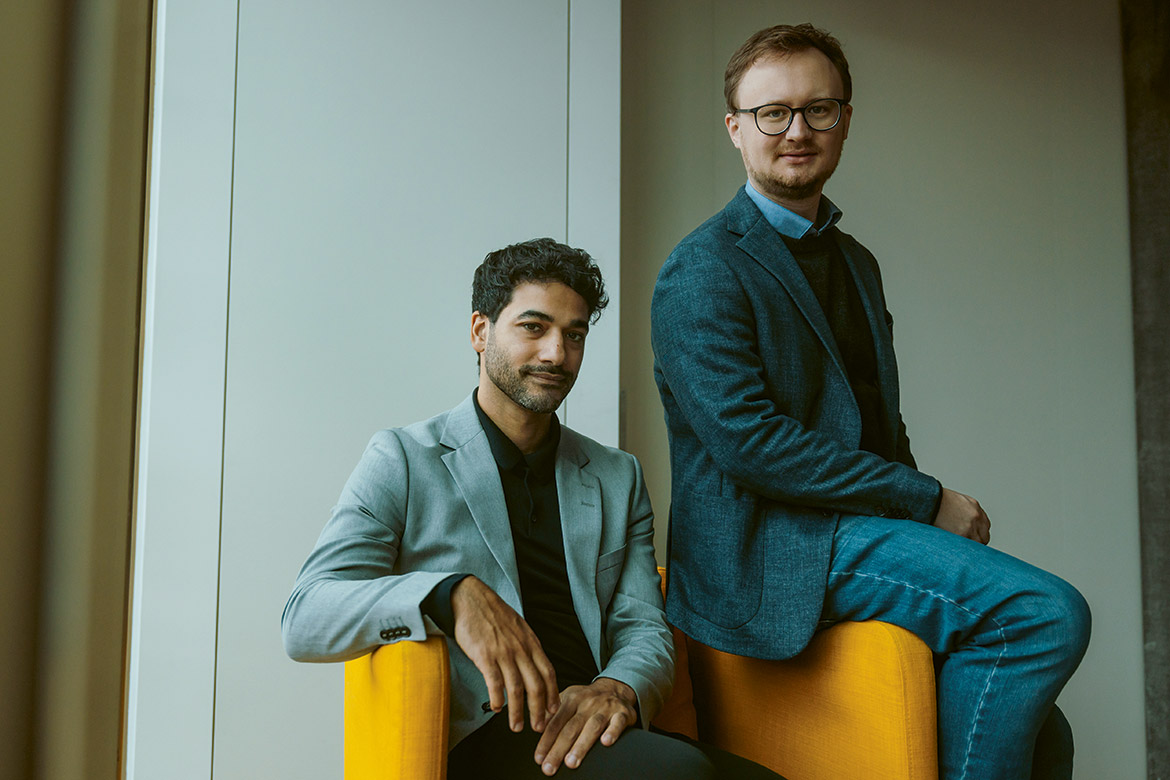
Amir Dziri, a professor of Islamic Studies, and Martin Steiner, a researcher into Judaism, here engage in a direct dialogue. | Photo: Ulrike Meutzner
Last year’s brutal terrorist attack by Hamas in Israel triggered worldwide horror and condemnation – except for a few cases where it actually met with approval. Nor were academic circles free from such reactions, as is clear from a post on X (formerly Twitter) by a lecturer at the Institute for the Study of the Middle East and Muslim Societies at the University of Bern, who described the attack of 7 October 2023 as a “gift”. As a result, that Institute has now been closed. Israel’s subsequent large-scale bombardment of the Gaza Strip has triggered fierce criticism. Since then, anti-Semitic incidents have been on the rise across the world. Even here in Switzerland, security concerns forced the cancellation of the anniversary celebrations of the Centre for Jewish Studies at the University of Basel.
This process of polarisation has therefore also brought research institutes to the attention of broader society. We contacted the director of the Swiss Center for Islam and Society (SZIG) at the University of Fribourg, Amir Dziri, and the ad interim Managing Director of the Institute of Jewish-Christian Research (IJCF) at the University of Lucerne, Martin Steiner, to ask them for their opinions on these developments. As yet, neither institute has been caught up in the heated media debates, and they deal with their respective religion on a theological level. We all met together in Bern.
1 – Under pressure to make a public statement
It was by no means to be expected that these two representatives would immediately accept our invitation to exchange views. And given the current troubling context, their answers are cautious. “Jews around the world are affected by what’s happening in Israel and Palestine. But we’re not a Middle East institute whose task is to explain the political situation in the region”, says Steiner right at the outset. For the record, he is not Jewish himself.
Dziri adds: “Both Judaism and Islam are perceived very much through the lens of international events. This is why there’s an automatic reaction, with people wanting to know what Jews and Muslims in Switzerland have to say about things. Yet the reality of their lives in this country is completely different, and many either can’t comment on what’s happening, or don’t want to”. In the current climate of uncertainty, it’s not easy to cope with this pressure to adopt a clear stance.
2 – Dealing with personal involvement
At the Lucerne Institute of Jewish Studies, the staff feel a strong sense of personal anguish, says Steiner, because some of them were in Israel at the time of the attack, or are themselves Israeli nationals. “But here at the Faculty of Theology, we’re also engaged in a dialogue with Muslim staff working in Islamic theology. It was invaluable to feel their sympathy after the barbaric terrorist attack”. Steiner is aware that students are afraid of how the conflict might develop. In Fribourg, too, Dziri recalls how there was bewilderment and sympathy after the events of October: “We had discussions in particular about the possible impact of these attacks on social coexistence here in Switzerland”. They were afraid that greater social polarisation might result, and that religious minorities might in general be confronted with greater mistrust. And when the Israeli Army attacked the Gaza Strip, this caused great suffering among the local civilian population. Steiner hopes that “people’s perspective will once again be focussed on a peaceful, secure state of coexistence in the country”.
Has the current, tense atmosphere resulted in any subjects becoming taboo at their institutes? “No”, they both agree. Steiner is insistent that: “This is a good thing. Scholarship has to be free”. Dziri has for years been researching into anti-Judaism among Muslims, but also into the “potential of an Islamic peace ethic that might be able to contradict the legitimisation of violence through religion that occurs in extremist Muslim milieus”. He sees how both Jewish and Muslim students are under great pressure to assume a clear stance with relation to events. “There are also few spaces that aren’t strongly polarised where they might actually be able to express their concerns”. There have been no demonstrations in favour of Hamas at his institute. “It shocked me that there were people who expressed happiness at the attack. I’m glad that I was not confronted with this in my immediate environment”.
3 – Communicating during a crisis
The Center for Islam and Society has long been confronted with sensitive issues and controversial topics, says Dziri: “Religion, and Islam in particular, is a very emotional topic that deeply affects a lot of people”. This is why there’s always just a few specific people who are nominated to speak publicly on behalf of the Center.
After the Hamas attacks, no special recommendations were necessary regarding how staff or students should behave, he says, and that also applied to the use of social media: “We have an account for the Center that we use to pursue a sober communication strategy. We don’t react to debates. Instead, we make our content accessible to a broader public”. The Faculty of Theology at the University of Lucerne also uses social media to communicate knowledge, not to act as a political player.
4 – Independent scholarship
Steiner is clear about one thing: “Scholarship and research must be neutral. Results, data and facts might be used and interpreted by politicians, but scientists and scholars shouldn’t play at politics”. At the same time, however, he is insistent that “politics should have no influence on what we research and what we teach, so that we can remain impartial and independent”. Dziri looks at Steiner and nods in agreement. But he also believes that research can never be completely neutral: “Having our own opinions and attitudes means we’re all personally involved”. Against this background, however, he emphasises that it’s necessary to establish a methodological distance “so that the statements we make as scholars are not driven by our own conceptual world”.
Steiner offers an example of how this can work in practice: “Students confront us with questions about the degree to which Israeli policy might be considered commensurate, about the extent to which one might be permitted to criticise the Israeli government, and about the boundaries of anti-Semitism”. They want criteria to help them make their own judgements. Nathan Scharanski’s so-called 3D test can be useful here. He says, for example: “If double standards, delegitimisation or demonisation are involved, then it’s anti-Semitism”. It’s important, says Steiner, to offer students a tool that they can use. (Ed.: ‘double standards’ refers to instances where people apply different standards to Israeli policy than to the policy of other states; delegitimisation means questioning Israel’s right to exist; and demonisation means that Israel is portrayed as evil in and of itself). Dziri also uses Scharanski’s 3D test at the SZGI: “It’s a good means of orientation for the current discussions, and when engaging in dialogue”.
5 – The expectation that everything will be explained to society
There is justifiable public interest in being able to categorise what’s happening right now, says Dziri, though he has also observed a development that is generally problematic, namely that research is increasingly under a certain pressure to be useful. “Almost every study paper today contains recommendations for politics or society. To a certain extent, people expect these papers to be couched in such a way that they offer concrete options for action”.
But not everything concerning the Middle East can be explained through the lens of Jewish studies or Islamic theology. “When it comes to Islamists here in Switzerland who try to instrumentalise the Israel-Gaza conflict in an attempt to gain more supporters for their ideology, then I can help to counteract them”, says Dziri. But answering questions about the future political prospects for the Middle East is not part of his “core expertise”.
6 –Enacting dialogue instead of adopting fixed positions
Dziri is also somewhat sceptical about scholarly activism on social media: “Discussions in which someone takes a specific stance don’t actually get me anywhere, neither intellectually nor emotionally. It would be more important to adopt formats that offer opportunities for interactive dialogue”. He himself prefers informal exchanges in an interdenominational group: “At the moment, it’s really only through personal relationships that we can come together and find common ground. That’s why I invest most of my energies in them”. This naturally cannot solve the Middle East conflict, but it can at least demonstrate that compassion and solidarity exist. “For me personally, that is the best way to heal in the current situation”, he says.
Steiner also emphasises the potential that scholarship harbours for creating dialogue: “If you can agree on a methodological basis or a variety of methodologies, then you can often still exchange ideas in instances where other dialogue channels have already been broken off or have been eroded to such an extent that dialogue is no longer possible”. Being able to meet and engage with each other is one of the most important things. Dziri and Steiner have proved this themselves by simply sitting down and engaging in the discussion that we’ve documented in this article.

